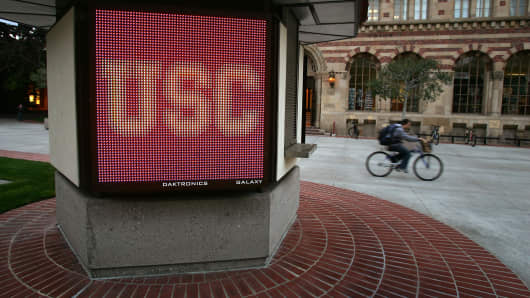In CNBC’s social media on campus series, we asked editors at college papers across the country: What social media platforms are hot? Are any of them dead or just for old people? This installment is by Sonali Seth, a sophomore at the University of Southern California.
We, millennials, have fallen out of love with Facebook for exactly the same reason we fell in love with it: its unapologetic ubiquity.
Like so many other social networks, its increasing publicity of our online presence has forced us to grapple with new questions about what it means to exist on a screen and in person.
While the ability to tell our hundreds of Facebook friends minute details of our lives — whether it be through constant status updates, wall posts or charmingly low-quality photos — used to be both socially acceptable and embarrassingly fun, the presence of parents, teachers and future employers on Facebook means that millennials’ actions on the network have social consequences.
So, while Facebook’s marketing to expand beyond young people may have increased the breadth of their user base, it has come at the expense of the image of Facebook as THE social network for millennials.
Today, we have adopted it as more of an established base of interconnections that allows us to virtually stalk anyone we’ve ever known than a platform to communicate with friends on a daily basis.
It’s not that the usage of Facebook by young people has declined — 87 percent of online adults 18 to 29 use Facebook, according to a Pew Research poll — but rather that its utility has evolved.
Millennials post less now and about less trivial things. Perhaps this is because we’re older and more mature, but it’s also because Facebook’s omnipresence has given everyone we’ve ever known access to our lives. This has forced us to create and maintain a public persona: We’re less likely to broadcast all of our lives authentically, and more likely to engage in selective sharing.
Contents
We’re all Photoshopped now
Meanwhile, Instagram, which a lot of our friends are on but not as many family members as Facebook, has given us the use of filters and photo manipulation to create a photo-sharing network that is more visually perfect — and unreal — than ever before.
Instagram star Essena O’Neill highlighted the false sense of reality that social media creates when she unexpectedly quit social media after amassing 700,000 Instagram followers, explained that it had made her “miserable.” She recaptioned her photos with captions like “NOT REAL LIFE — took over 100 in similar poses trying to make my stomach look good.”
Perhaps, then, the drawback of creating online personas lies in an inability to distinguish between public and private life. Given that Instagram, as well as most major social media, is so heavily visual, it’s easily subject to visual manipulation. And though we’ve always been used to models Photoshopped on magazine covers and billboard ad campaigns, social media allows us to Photoshop ourselves — not just with Instagram filters and comprehensive photo editing apps available at our fingertips, but also with selectively choosing memories to share, distorting the way others see us and the way we see ourselves.
Where we get real
It’s the infiltration of the gross pressures of socialization in our online lives, then, that most contributed to a need for an unfiltered, unadulterated and more direct sharing app.
“Snapchat lets millennials broadcast their lives only to people that they care about.”
Enter Snapchat, which allows users to send snaps for up to 10 seconds, after which they disappear. Since users have to tap each person they’d like to send it to, only a few of which are convenient to send to at a time, Snapchat lets millennials broadcast their lives only to people that they care about.
There’s no sense of warped virtual validation that arises via Facebook “likes” or Instagram “hearts” and no social pressure to conform to a public persona. Snapchat avoids the traps of Facebook and Instagram by keeping private lives private — a social network that isn’t too social.
Despite what some in the generations that came before us may think, social media won’t be the death of us. Millennials won’t become a homogenous group of narcissistic food photographers who can’t-for-the-life-of-them put down their phones to decide between Hudson and Valencia (Instagram filters) and avoid walking into telephone poles.
In order to be truly introspective, we will have to navigate social politics as it enters our virtual lives, all while we come closer to deciphering who we are, who we want to be and how we want the world to see us. Generations before us have lived through this struggle. But what’s different for us is that we have to figure it out online, too. “Like” it — or not.
Commentary by Sonali Seth, a sophomore studying political science and policy, planning, development at the University of Southern California. She is also the editorial director of USC’s Daily Trojan. You can find her musing about national and Los Angeles politics on Follow her on Twitter @sonalers.
In CNBC’s social media on campus series, we asked editors at college papers across the country: What social media platforms are hot? Are any of them dead or just for old people? This installment is by Sonali Seth, a sophomore at the University of Southern California.
We, millennials, have fallen out of love with Facebook for exactly the same reason we fell in love with it: its unapologetic ubiquity.
Like so many other social networks, its increasing publicity of our online presence has forced us to grapple with new questions about what it means to exist on a screen and in person.
While the ability to tell our hundreds of Facebook friends minute details of our lives — whether it be through constant status updates, wall posts or charmingly low-quality photos — used to be both socially acceptable and embarrassingly fun, the presence of parents, teachers and future employers on Facebook means that millennials’ actions on the network have social consequences.
So, while Facebook’s marketing to expand beyond young people may have increased the breadth of their user base, it has come at the expense of the image of Facebook as THE social network for millennials.
Today, we have adopted it as more of an established base of interconnections that allows us to virtually stalk anyone we’ve ever known than a platform to communicate with friends on a daily basis.
It’s not that the usage of Facebook by young people has declined — 87 percent of online adults 18 to 29 use Facebook, according to a Pew Research poll — but rather that its utility has evolved.
Millennials post less now and about less trivial things. Perhaps this is because we’re older and more mature, but it’s also because Facebook’s omnipresence has given everyone we’ve ever known access to our lives. This has forced us to create and maintain a public persona: We’re less likely to broadcast all of our lives authentically, and more likely to engage in selective sharing.
We’re all Photoshopped now
Meanwhile, Instagram, which a lot of our friends are on but not as many family members as Facebook, has given us the use of filters and photo manipulation to create a photo-sharing network that is more visually perfect — and unreal — than ever before.
Instagram star Essena O’Neill highlighted the false sense of reality that social media creates when she unexpectedly quit social media after amassing 700,000 Instagram followers, explained that it had made her “miserable.” She recaptioned her photos with captions like “NOT REAL LIFE — took over 100 in similar poses trying to make my stomach look good.”
Perhaps, then, the drawback of creating online personas lies in an inability to distinguish between public and private life. Given that Instagram, as well as most major social media, is so heavily visual, it’s easily subject to visual manipulation. And though we’ve always been used to models Photoshopped on magazine covers and billboard ad campaigns, social media allows us to Photoshop ourselves — not just with Instagram filters and comprehensive photo editing apps available at our fingertips, but also with selectively choosing memories to share, distorting the way others see us and the way we see ourselves.
Where we get real
It’s the infiltration of the gross pressures of socialization in our online lives, then, that most contributed to a need for an unfiltered, unadulterated and more direct sharing app.
“Snapchat lets millennials broadcast their lives only to people that they care about.”
Enter Snapchat, which allows users to send snaps for up to 10 seconds, after which they disappear. Since users have to tap each person they’d like to send it to, only a few of which are convenient to send to at a time, Snapchat lets millennials broadcast their lives only to people that they care about.
There’s no sense of warped virtual validation that arises via Facebook “likes” or Instagram “hearts” and no social pressure to conform to a public persona. Snapchat avoids the traps of Facebook and Instagram by keeping private lives private — a social network that isn’t too social.
Despite what some in the generations that came before us may think, social media won’t be the death of us. Millennials won’t become a homogenous group of narcissistic food photographers who can’t-for-the-life-of-them put down their phones to decide between Hudson and Valencia (Instagram filters) and avoid walking into telephone poles.
In order to be truly introspective, we will have to navigate social politics as it enters our virtual lives, all while we come closer to deciphering who we are, who we want to be and how we want the world to see us. Generations before us have lived through this struggle. But what’s different for us is that we have to figure it out online, too. “Like” it — or not.
Commentary by Sonali Seth, a sophomore studying political science and policy, planning, development at the University of Southern California. She is also the editorial director of USC’s Daily Trojan. You can find her musing about national and Los Angeles politics on Follow her on Twitter @sonalers.
[“source -cncb”]








